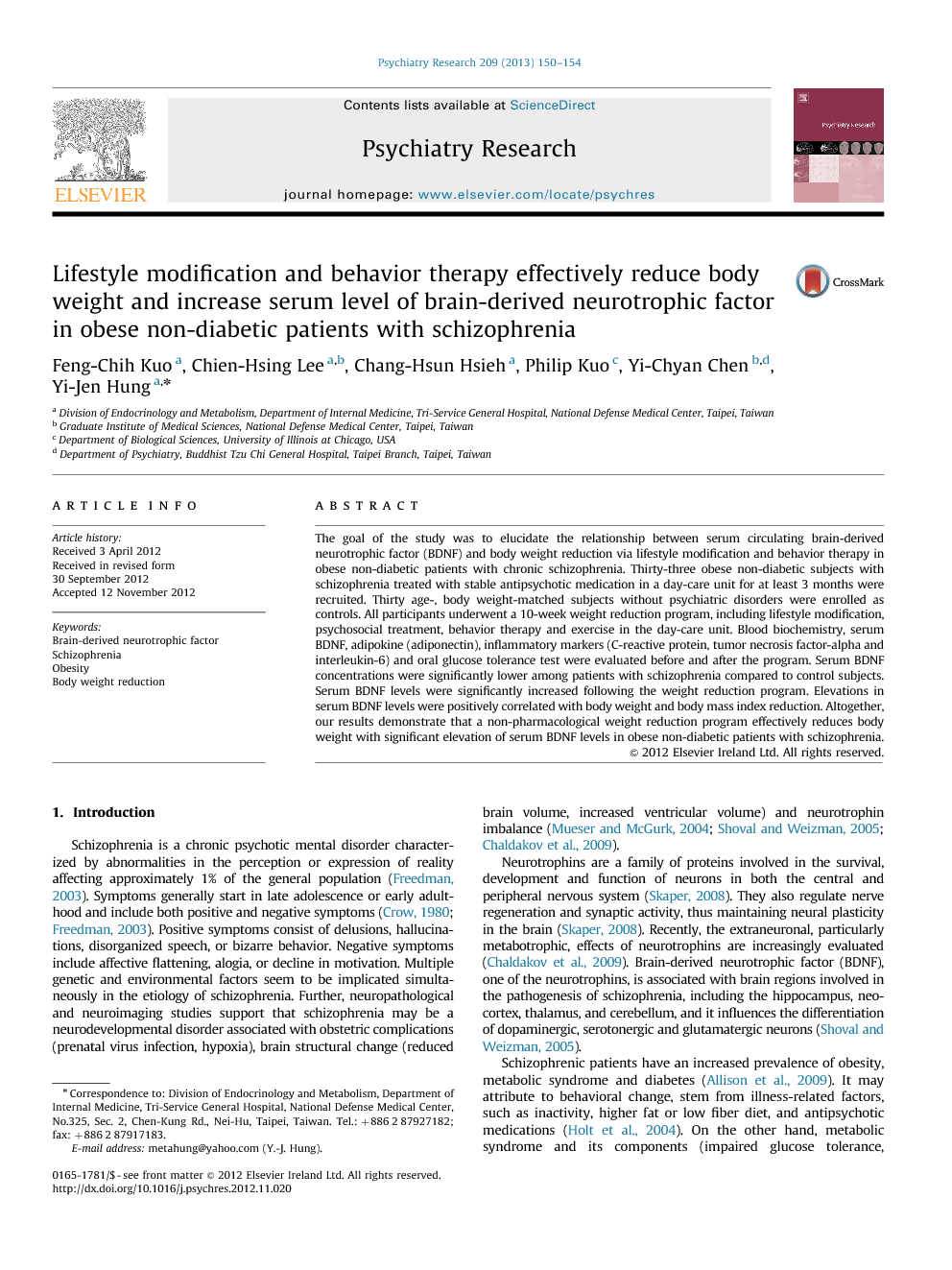The goal of the study was to elucidate the relationship between serum circulating brain-derived neurotrophic factor (BDNF) and body weight reduction via lifestyle modification and behavior therapy in obese non-diabetic patients with chronic schizophrenia. Thirty-three obese non-diabetic subjects with schizophrenia treated with stable antipsychotic medication in a day-care unit for at least 3 months were recruited. Thirty age-, body weight-matched subjects without psychiatric disorders were enrolled as controls. All participants underwent a 10-week weight reduction program, including lifestyle modification, psychosocial treatment, behavior therapy and exercise in the day-care unit. Blood biochemistry, serum BDNF, adipokine (adiponectin), inflammatory markers (C-reactive protein, tumor necrosis factor-alpha and interleukin-6) and oral glucose tolerance test were evaluated before and after the program. Serum BDNF concentrations were significantly lower among patients with schizophrenia compared to control subjects. Serum BDNF levels were significantly increased following the weight reduction program. Elevations in serum BDNF levels were positively correlated with body weight and body mass index reduction. Altogether, our results demonstrate that a non-pharmacological weight reduction program effectively reduces body weight with significant elevation of serum BDNF levels in obese non-diabetic patients with schizophrenia.
Schizophrenia is a chronic psychotic mental disorder characterized by abnormalities in the perception or expression of reality affecting approximately 1% of the general population (Freedman, 2003). Symptoms generally start in late adolescence or early adulthood and include both positive and negative symptoms (Crow, 1980 and Freedman, 2003). Positive symptoms consist of delusions, hallucinations, disorganized speech, or bizarre behavior. Negative symptoms include affective flattening, alogia, or decline in motivation. Multiple genetic and environmental factors seem to be implicated simultaneously in the etiology of schizophrenia. Further, neuropathological and neuroimaging studies support that schizophrenia may be a neurodevelopmental disorder associated with obstetric complications (prenatal virus infection, hypoxia), brain structural change (reduced brain volume, increased ventricular volume) and neurotrophin imbalance (Mueser and McGurk, 2004, Shoval and Weizman, 2005 and Chaldakov et al., 2009).
Neurotrophins are a family of proteins involved in the survival, development and function of neurons in both the central and peripheral nervous system (Skaper, 2008). They also regulate nerve regeneration and synaptic activity, thus maintaining neural plasticity in the brain (Skaper, 2008). Recently, the extraneuronal, particularly metabotrophic, effects of neurotrophins are increasingly evaluated (Chaldakov et al., 2009). Brain-derived neurotrophic factor (BDNF), one of the neurotrophins, is associated with brain regions involved in the pathogenesis of schizophrenia, including the hippocampus, neocortex, thalamus, and cerebellum, and it influences the differentiation of dopaminergic, serotonergic and glutamatergic neurons (Shoval and Weizman, 2005).
Schizophrenic patients have an increased prevalence of obesity, metabolic syndrome and diabetes (Allison et al., 2009). It may attribute to behavioral change, stem from illness-related factors, such as inactivity, higher fat or low fiber diet, and antipsychotic medications (Holt et al., 2004). On the other hand, metabolic syndrome and its components (impaired glucose tolerance, abdominal or central obesity, hypertension, hypertriglyceridemia and reduced high-density lipoprotein cholesterol) are also linked to the risk of developing cognitive impairment (Frisardi et al., 2010). Previous studies in schizophrenic patients on long-term treatment with antipsychotics found that decreased brain-derived neurotrophic factor (BDNF) levels were associated with weight gain in females and variations in the BDNF gene may be a risk factor for weight gain in male patients (Zhang et al., 2007 and Zhang et al., 2008). Animal studies have also revealed that central or peripheral administration of BDNF decreases food intake, increases energy expenditure, and ameliorates hyperinsulinemia and hyperglycemia by a central nervous system-mediated mechanism (Nagakawa et al., 2000, Nonomura et al., 2001, Tsuchida et al., 2001 and Xu et al., 2003). BDNF is expressed at high levels in the ventromedial hypothalamus, which is responsible for the regulation of food intake and body weight (Rao et al., 2008). Several lines of evidence support the important role of BDNF in eating behavior, weight regulation and the pathophysiology of schizophrenia; thus, pharmaceutical or non-pharmaceutical methods developed to increase central or peripheral BDNF levels may present a novel approach in the treatment of obesity or schizophrenia (Chaldakov et al., 2009, Buckley et al., 2011 and Favalli et al., 2012).
In diabetic mice on voluntary wheel running and dietary energy restriction, increased levels of BDNF with enhanced dendritic spine density in the hippocampus were demonstrated (Stranahan et al., 2009). In clinical studies, treadmill walking for 30 min increased BDNF concentrations in panic disorder patients (Ströhle et al., 2010); elevated serum BDNF levels were found after a 3-month reduced-calorie diet in obese subjects (Araya et al., 2008) and after at least a 1-month hypocaloric diet in schizophrenic patients (Guimarães et al., 2008). Since schizophrenic patients are vulnerable to the metabolic syndrome with subsequent morbidity of cardiovascular disease, it is desirable to promote weight reduction in obese schizophrenic patients and evaluate the change of serum BDNF levels. Hence, we conducted a weight reduction program including exercise, lifestyle modification, and psychosocial/behavioral therapy in obese non-diabetic subjects with chronic schizophrenia to determine the possible relationship between BDNF and body weight reduction.
Significant decreases in body weight, BMI, waist circumference and waist-to-hip ratio were observed following the 10-week weight reduction program (Table 2). Serum BDNF concentrations were significantly lower among patients with schizophrenia compared to control subjects (4.45±0.63 and 21.47±1.05 ng/ml, P<0.001). Serum BDNF values were significantly increased (4.45±0.63 to 9.10±1.42 ng/ml, P<0.001) after the weight reduction program ( Table 3, Fig. 1). The elevation in serum BDNF levels after the weight reduction program were significantly positively correlated with body weight and BMI reduction (r=0.773, P=<0.0001 and r=0.630, P=<0.001 respectively) ( Fig. 2 and Fig. 3). CRP was significantly higher among patients with schizophrenia and obesity compared to control subjects (0.25±0.05 and 0.10±0.02 mg/dl, P<0.05), but showed no significant change after the weight reduction program ( Table 3). Blood biochemistry (fasting glucose, insulin, HOMA-R, HOMA-β, lipid profiles), adiponectin levels, inflammatory factors (IL-6, TNF-α), oral glucose tolerance test and BPRS showed no significant difference.


